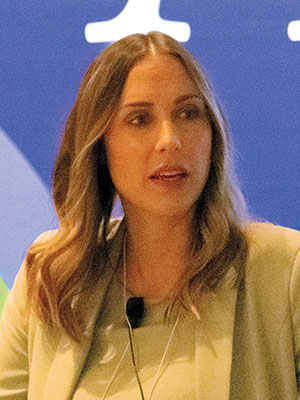
Social media use — and misuse — continues to increase, so a Monday morning session at the ACR/ARP Annual Meeting focused on how medical professionals can successfully navigate the digital world.
During Tweets & Trolls: How to Handle Social Media, Jilaine Bolek Berquist, MD, a rheumatologist in Janesville, WI, walked the audience through the pluses and pitfalls of social media, sharing tips and guidance on maintaining medical professionalism while also maintaining a Twitter handle and other social media accounts.
A common tenet of being a good medical professional is being an active member of the community. It’s the best way to know what issues are facing the population you treat. In 2019, Dr. Berquist said, most of the community can be found on the internet.
“I would argue that we need to be there, too,” Dr. Berquist said. “We’re part of the community, and we need to be out there making sure that there’s correct information and seeing what our patients are looking at on the internet so that when you get that rheumatoid arthritis patient that comes into clinic and says, ‘Hey, I’m not going to take methotrexate cause I think you’re going to kill me,’ you know what they are looking at.”
But what constitutes proper professional behavior online? It’s not as easy and straightforward as it may seem. Guidelines tend to be vague, and everybody has their own sense of what’s inappropriate.
Dr. Berquist suggested that when trying to determine what to post on social media, think of what would be inappropriate behavior for a medical professional in a public space, such as a hospital elevator.
“When we’re rounding and we go into the elevator, everybody just stops talking about the case or whatever medical thing we’re talking about,” she said. “And we kind of stand there awkwardly. We can think of the internet a little bit like our hospital elevator, except these days, the entire world is on our hospital elevator, and they’re listening to what we’re saying.”
There are some “never” behaviors. Medical professionals should refrain from posting:
- Misleading claims of treatment outcomes
- Misreprentation of board certification
- Posting patient images without clear consent
- Posting pictures of intoxication or sexually explicit material
- Anything illegal
Being accessible online may lead to patients or patients’ family members requesting to become friends on Facebook or similar personal interactions on other social media sites. Dr. Berquist recommends against that. If a patient needs to communicate with you, she said, guide them to interact on a secure closed system — Dr. Berquist’s health system has an electronic medical system that has the capability to message, text, and email with patients — and make sure to inform them of privacy protections in place, establish expectations about response time to messages, and have them agree to terms before starting.
While there are significant ethical concerns surrounding posting about about cases, Dr. Berquist said that so long as everything to protect patient privacy is done and the intent is for good — educating or seeking advice from others — then ethically it’s justifiable. She shared the example of a group of pathologists who like to interact online and discuss their pathology slides. To protect patient privacy, they change some information that isn’t clinically relative. For example, they’ll say something is a right leg mass when it’s a left leg mass, and not use exact ages.
“The goal is for the patients not to be able to identify themselves in your post,” she said.
